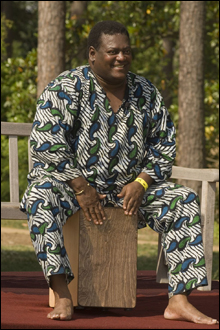Straight talkFUNDA’s communal communication January 16,
2008 2:24:49 PM

EXPRESSING TRUE MEANING: Pritchett.
|
Jumping into their tenth year of presenting the storytelling festival called FUNDA, the Rhode Island Black Storytellers (RIBS) have expanded the fest, with performances January 20 and 21 and 25-27. Between those dates are many presentations at schools, appropriate to the Swahili and Zulu word “funda,” which means to teach and to learn.
Local storytellers taking part are festival director Valerie Tutson, plus Len Cabral, Abigail Ifatola Jefferson, Raffini, Melodie Thompson, and Rochel Coleman. Local musicians and spoken word artists include Jon Mahone and Ghislaine Jean Mahone (Riders Against the Storm) and Spittin Images (Christopher Johnson, Yunus Quddos, and Lawrence Nunes).
National and international guests are Dylan Pritchett, from Williamsburg, Virginia, president of the National Association of Black Storytellers and author of The First Music; Teju Ologboni, a festival favorite from Milwaukee; and Amina Blackwood Meeks, a preeminent storyteller from Jamaica.
Growing up in Williamsburg, Pritchett has worked at Colonial Williamsburg since college, developing programs about 18th-century African history in order to train the staff to perform as characters from that era. He has completed commissions from many museums, arts centers, and historical organizations to create stories from a particular time and place. And Pritchett has developed programs for middle school students to learn how to write the stories of black and white Americans during the Civil War or to write their own family histories.
At FUNDA, he may tell “Mama’s Tears,” about the era of the Underground Railroad, or “his grandmother’s story”: “A Special Place by the Window.” The latter has references to his grandfather’s wake, in which the coffin was brought to the house, and to “snow cream,” made by pouring hot syrup onto freshly-fallen snow. Students who have heard this story are surprised that such things happened during Pritchett’s lifetime (he was born in 1959).
Pritchett’s book, The First Music, takes place in the jungle, with colorful illustrations by Erin Bennett Banks. He encountered a teacher who praised the book’s ability to engage a child in the physical relationship of holding it and turning the pages rather than looking at a TV or computer screen.
“The same physical nature that a book has, to communicate through story, is what good storytellers offer,” Pritchett noted in a recent phone conversation. “To communicate effectively on a daily basis requires people to become more verbal. Children begin to write the way that they speak, and that has to do with listening to words and forming your thoughts into words. Storytelling is to be able to sit down and listen.
“For adults,” he continued, “storytelling also illustrates the importance of communication — to be able to express the true meaning of what you’re trying to say, rather than just thinking of the biggest word.”
Pritchett views his storytelling as rooted in the African oral tradition of teaching through stories rather than just entertaining, though he can’t deny that most of his stories have an entertaining element.
“My stories are intended to teach morals and value, build self-esteem, to touch upon everyday themes that the students or audience will understand through story,” he explained. “Once I tell it, then we talk about it.” At the same time, he understands the transcendent nature of storytelling. He recalled a little girl who asked her teacher after a short appearance in the classroom, “Is he black?”
“That was a moment when I truly realized that the art itself is what’s important,” he observed. “If you can share the art, it’s what will draw people and they will begin to reflect. It doesn’t matter what you wear. African clothes aren’t necessary. The art form carries on the tradition. If you do it right, some things become second. The art will make people reflect.”
Pritchett admitted that storytelling is “an adult art form you have to do for kids if you’re going to make a living.” But he said: “It’s better than a movie.”
|
 |

|
- A musical battle of the sexes
- Rawson bridges two distinctly different eras in journalism
- Never mind its tough-girl alt-porn feminism: SuicideGirls has already moved on to a new generation
- The answer, my friend, is blowin’ in the DIURNAL atmospheric DISEQUILIBRIUM
- Win or lose, Obama's small donors may have already brought a revolution in campaign financing
- With Democrats in total control of state government, the Massachusetts GOP should be a rising voice of dissent. Instead, it seems more impotent than ever.
- Nobel Prize-winning economist Joseph Stiglitz explains the punishing cost of staying any longer
- Michael Morse’s Rescuing Providence
- Rawson bridges two distinctly different eras in journalism
- Julian Kuerti leads the BSO and Leon Fleisher, Stockhausen’s Mantra at Harvard, Emmanuel’s St. John Passion
- Now more than ever, this is Marty Baron’s newspaper
- Al Basile is still groovin’ onThe Tinge
|
-
Fusionworks’ captivating mood swings
-
Festival Ballet’s intimate showcase
-
Still swinging
-
Mixed Magic’s latestSpirit Warrior
-
Milbre Burch’s ‘Theatre of the Spoken Word’
-
A smile-inducing flower of a place
-
Making the leap with Garth Fagan
-
Dressed up and still homey
-
Festival Ballet’s masterful Motion
-
An intimate destination
|

|